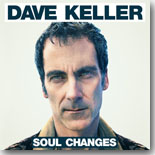 Soul singer /
guitarist Dave Keller's fourth CD, Soul
Changes (Tastee-Tone Records), is his best yet.
Keller and producer Bob Perry raised the bar this
time by traveling to Willie Mitchell's Royal
Recording studio in Memphis to record a portion of
this disk.
Soul singer /
guitarist Dave Keller's fourth CD, Soul
Changes (Tastee-Tone Records), is his best yet.
Keller and producer Bob Perry raised the bar this
time by traveling to Willie Mitchell's Royal
Recording studio in Memphis to record a portion of
this disk.
The first six cuts
feature the Hi Rhythm Section (brothers Teenie,
Leroy and Charles Hodges) along with other notable
musicians from the Stax era. Arguably, this backing
band represents the
greatest collection of soul musicians alive today.
The remaining five numbers, equally strong,
were recorded in Brooklyn and backed by local legends
The Revelations. The accompaniment and arrangements
on all 11 cuts are top-notch --- actually, as good as
it gets in soul music.
The standout song
from the Memphis sessions is a Keller original and
one that
is already in contention for my personal favorite
song of the year. "17 Years" is tormented, tortured
soul at its best, autobiographical in nature as
Keller sings about the end of his own marriage. I've
been somewhat lukewarm about Keller as a vocalist in
the past, thinking that he's more in the "B"
level
of contemporary soul singers, but the lament in his
voice on this number is the sign of an accomplished
vocalist.
Another original, "I
Wish We'd Kissed," continues the same theme as "17
Years," as the anguish over a lost love pours out of
Keller's heart through his vocal chords. He starts
to show some signs of recovering from the heartache
on the next cut, "Lonely And I," as he sings " ...
Lonely and I get along just fine ..." Rell Gattis
and Halley Hiatt provide sympathetic background
vocals on both of these tunes.
Keller's back
expressing his sorrows on the last of the six
Memphis cuts, "One More Time," as he's begging his
woman for the chance to love her once more.
While they are part of the top-shelf accompaniment
on all cuts, I especially like the work of The Royal
Horns (Marc Franklin, Lannie McMillan, Jr. and Kirk
Smothers) here.
"Searchin' For A Sign," which is more
of an up-tempo number again with strong work from the
horn section. It's a song of hope that is an
effective opener to the CD. Keller also gives us the
ballad "Old Man's Lullaby," as he talks about the
time of night when the pain of his lost love affects
him the most.
Moving eastward to
Brooklyn for the last five numbers, Keller forgoes
his original compositions in order to cover more
obscure soul classics done earlier by The O'Jays,
The Temptations, Bobby Womack, Candi Staton, Otis
Clay, and The Patterson Twins, among others.
The O'Jays song,
"It's Too Strong," kicks off this portion of the
disc by showcasing equally capable horn work from
The Brooklyn Horns (Geoff Countryman, Joe Ancowitz
and Rick Parker). "Back In Love Again," written by
George Jackson, has Keller feeling better after the
anguish he showed on the Memphis recordings, and his
voice produces more power and range in order to express
this newfound joy.
I really like the
Smokey Robinson original, "Don't Look Back," another
song that gives the horn section more opportunities
to stand out. Also covered by The Temptations, I was
more familiar with the version done together by
Peter Tosh & Mick Jagger, but I like Keller's
rendition equally well. Candi Staton's "Heart On A
String" is another up-tempo number with strong work
from the horns and Keller's best guitar solo on the
disc.
"Is It Over?,"
another heart-tugger done earlier by Otis Clay,
closes the album in fine form as Keller begs for one
more chance from his lover. He ends the song with
the unanswered question "... Is it over?..."
We know we are at the end of this fine album, but
we're left with Keller not having closure to the
tortured relationship that obviously influenced
these recordings.
There's a lot of
powerful music on Soul Changes, as I suspect
that Keller has opened up his heart and soul so that all of us
can feel his pain. The strength of this CD will have
me re-visiting past Keller albums to see what I've been
missing. But if you are just catching on to the
music of Dave Keller, then Soul Changes is an
excellent starting point.
---
Bill Mitchell
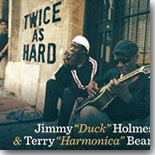 Jimmy “Duck” Holmes and Terry “Harmonica” Bean are
just two of the recent crop of exciting solo
Mississippi blues artists who have emerged over the
past decade. Holmes has almost single-handedly
rejuvenated the classic Bentonia brand of blues
while interspersing his own personal touches, and
Bean has also made a name for himself as a solo
artist, after starting in support of artists like
Asie Payton and T-Model Ford.
Jimmy “Duck” Holmes and Terry “Harmonica” Bean are
just two of the recent crop of exciting solo
Mississippi blues artists who have emerged over the
past decade. Holmes has almost single-handedly
rejuvenated the classic Bentonia brand of blues
while interspersing his own personal touches, and
Bean has also made a name for himself as a solo
artist, after starting in support of artists like
Asie Payton and T-Model Ford.
Both artists have also appeared in a couple of
recent documentaries, M for Mississippi and
We Juke
Up In Here, actually appearing together in that
film, where they proved to have a very strong
rapport. Having also turned in well-received
performances at the Chicago Blues Festival and also
in Switzerland at the Geneva Art Festival, it made
perfect sense for the duo to make a recording, which
is just what they did, having just released Twice As
Hard on Broke & Hungry Records.
Holmes and Bean sat down for this session in late
2012, and the ten tracks show them in a variety of
settings, each getting a few solo tracks along with
several with them working together along with
drummer Frank Vick. Holmes carries on the
traditional Bentonia blues sounds on haunting tracks
like “Hear Me Howlin’,” “Lonesome Church Bell” (with
Bean in support), and “Raise That Window,” but on
tracks like “Wake Up Woman,” and “Broke and Hungry,”
both of which feature Bean’s exuberant harp playing,
he takes on a more traditional Delta sound.
Bean shines on his selections as well, the upbeat
“Boogie With Me” which he wrote, John Weston’s “Park
Your Car,” the Muddy Waters’ classic, “She Moves
Me,” and Doc Clayton’s “Cheating and Lying Blues.”
On the loose opener, “She Moved Across The Water,”
the pair trade off vocals. Bean’s harmonica playing
complements Holmes style very well. On the more
Bentonia-based tracks, it’s reminscent of Bud
Spires, who played with Bentonia bluesman Jack Owens
(and Holmes on his first album).
Twice As Hard is a great collaboration between Jimmy
“Duck” Holmes and Terry “Harmonica” Bean, two of the
Magnolia State’s premier solo artists. It will bring
a smile to the face of traditional blues fans
everywhere. Hopefully, we will hear more from this
partnership in the near future.
---
Graham Clarke
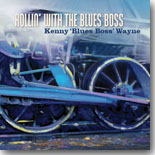 Kenny “Blues Boss” Wayne won accolades aplenty with
his 2011 release, An Old Rock On a Roll, winning a
pair of 2012 Living Blues Awards (Best New
Contemporary Blues Recording and Most Outstanding
Musician – Keyboard), and earning a Blues Foundation
nomination for the Pinetop Perkins Award. The
Vancouver resident’s latest Stony Plain release,
Rollin’ With the Blues Boss, should continue his hot
streak unabated.
Kenny “Blues Boss” Wayne won accolades aplenty with
his 2011 release, An Old Rock On a Roll, winning a
pair of 2012 Living Blues Awards (Best New
Contemporary Blues Recording and Most Outstanding
Musician – Keyboard), and earning a Blues Foundation
nomination for the Pinetop Perkins Award. The
Vancouver resident’s latest Stony Plain release,
Rollin’ With the Blues Boss, should continue his hot
streak unabated.
Wayne kicks off the disc with “Leavin’ In The Mornin’,”
a funky blues that’s reminiscent of ’70s B.B. King,
complete with King-styled guitar fills, courtesy of
producer Tom Lavin, who also contributes fretwork on
several other tracks. The jumping “You Bring Out The
Jungle In Me,” comes complete with miscellaneous
animal sounds and a tight horn section, “Hootenanny
Boogie-Woogie” is a nice old school track that will
get you on your feet, and “Roadrunner” is a
hard-driving R&B track.
Wayne duets with Diunna Greenleaf on the soul-blues
ballad, “Baby, It Ain’t You,” and keeps the
soul-blues vibe going with the next track, the
catchy “I Can’t Believe It.” Another guest star,
singer/guitarist Eric Bibb, teams with Wayne on the
entertaining acoustic tune, “Two Sides,” then Wayne
goes to the country for “Slow Down,” which slows the
pace just long enough for Wayne to blow the doors
off the disc with the three closing tracks, the
Crescent City boogie rocker, “Ogopopo Boogie,” “Keep
On Rockin’,” which continues the New Orleans vibe
with an irresistible Fess-like rhythm, and the
appropriately titled closer, “Out Like A Bullet.”
Fans of blues, R&B, and boogie-woogie piano will
love this disc. Kenny “Blues Boss” Wayne handles all
three styles with ease.
---
Graham Clarke
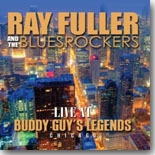 Like many guitarists of his generation,
Ray Fuller
was inspired by many of the British Invation
bands --- the Rolling Stones, the Yardbirds, the
Animals. Like many of his contemporaries did, Fuller
traced the music back to his inspirations’ original
inspirations --- John Lee Hooker, B.B. King, Muddy
Waters, Elmore James. He formed The Ray Fuller Band
in 1974, which eventually became Ray Fuller and the
Bluesrockers. The band became a mainstay of the Ohio
blues scene, opening for many of the legendary blues
acts that came through, and eventually releasing
several recordings for Rounder and other labels in
the ’80s and ’90s.
Like many guitarists of his generation,
Ray Fuller
was inspired by many of the British Invation
bands --- the Rolling Stones, the Yardbirds, the
Animals. Like many of his contemporaries did, Fuller
traced the music back to his inspirations’ original
inspirations --- John Lee Hooker, B.B. King, Muddy
Waters, Elmore James. He formed The Ray Fuller Band
in 1974, which eventually became Ray Fuller and the
Bluesrockers. The band became a mainstay of the Ohio
blues scene, opening for many of the legendary blues
acts that came through, and eventually releasing
several recordings for Rounder and other labels in
the ’80s and ’90s.
Today, 40 years after their beginnings, Fuller
and the Bluesrockers headline at Buddy Guy’s Legends
on Saturday nights. As you can imagine, 40 years
of honing your musical craft on a regular basis pays
dividends in a big way. For proof positive, just
check out Fuller and the band’s most recent release,
Live at Buddy Guy’s Legends Chicago (Azuretone
Records), recorded in April of 2013 before a very
receptive home audience, which included the
venerable Mr. Guy himself.
Fuller’s specialty is his electrifying slide guitar
and its on full display from the very first tune, a
scorching cover of Elmore James’ “Wild About You,
Baby,” and the intensity continues full-blast with
an rowdy original track, “Rock N’ Roll Cowboy” and a
relentless seven-minute-plus take on John Lee
Hooker’s “Boom Boom.” The original composition,
“Love and Alcohol,” has that ominous delta droning
backdrop, and “Bayou Blue,” another original, has a
nice CCR-flavored swampy vibe. The churning “Walkin’
Shoes,” which Fuller says is the first tune he ever
wrote, is a showcase for Fuller’s wild slide work
and some masterful keyboards from Keith Blair.
Fuller follows the three original songs with three
outstanding covers ---.a splendid remake of Otis Rush’s
“So Many Roads,” a raw and ragged reading of Jimmy
Reed’s “Take Out Some Insurance Baby,” and Billy Boy
Arnold’s “Rockinitus,” that smolders and burns with
intensity. Fuller works through two more originals,
the slow Delta burner, “Feelin’ Evil,” and “Sallie
Mae,” which has that thumping Bo Diddley beat,
before closing with Eddie Clearwater’s rollicking
anthem, “I Wouldn’t Lay My Guitar Down.”
Fuller’s slide guitar and gritty vocals are worth
the price of admission, and the Bluesrockers (Blair
– keyboards, Glen “Manny” Manuel – bass, Mark Ward –
drums, with guest Richard “Doc” Malone on harmonica)
more than earn their name with some impressive
high-energy fireworks. This is what a live album is
supposed to sound like.
---
Graham Clarke
 Born in South Texas, blues/rock guitarist
Brent
Johnson has been playing the guitar since he was
four, taking in blues, jazz, rock, punk, country,
and world music. After moving with his family to New
Orleans in his teens, he formed several bands that
played rock and the blues before beginning a lengthy
tenure with Bryan Lee’s Blues Power Band that
continues today. Johnson recently released his debut
recording as a front man, Set The World On Fire
(Justin Time), and you won’t find a more
appropriately titled disc --- it’s a scorcher!
Born in South Texas, blues/rock guitarist
Brent
Johnson has been playing the guitar since he was
four, taking in blues, jazz, rock, punk, country,
and world music. After moving with his family to New
Orleans in his teens, he formed several bands that
played rock and the blues before beginning a lengthy
tenure with Bryan Lee’s Blues Power Band that
continues today. Johnson recently released his debut
recording as a front man, Set The World On Fire
(Justin Time), and you won’t find a more
appropriately titled disc --- it’s a scorcher!
Johnson recorded the disc with his regular working
band (Bill Blok – bass, backing vocals, John Perkins
– drums), adding Wayne Lohr on keyboards for the
album, plus guest star Alvin Youngblood Hart, who
contributes some fierce guitar on three tracks – a
splendid cover of Bob Dylan’s “Meet Me In The
Morning,” the hard-driving original rocker “The
Ticket,” and a sweaty version of the Howlin’ Wolf
classic, “Meet Me In The Bottom.” Another guest
star, slide guitar legend Sonny Landreth, battles it
out with Johnson, no slouch on the slide himself, on
“Long Way Back To New Orleans.”
Of the 11 tracks on
Set The World On Fire, seven
are Johnson originals, including the opener, “Don’t
Make A Sound,” a funky track with some slashing
fretwork from Johnson and smooth keyboards from Lohr, the churning rocker “Don’t Take It With You,”
the soulful ballad “So Glad You’re Mine,” and a pair
of highly personal compositions (“Glass Ceiling” and
the title track) that find the guitarist looking
inward.
I really like Johnson’s choice of covers, which
includes the aforementioned Dylan and Howlin’ Wolf
tracks. However, the 13-minute version of “As
The Years Go Passing By” is extraordinary. Johnson
basically takes over this song and makes it his own
with a masterful performance both vocally and on
guitar. Most blues fans have heard this song
interpreted by dozens of artists over the years, but
it’s clear that this is no interpretation …. Johnson
has lived these lyrics. The other cover is a really
cool version of one of my favorite Earl Hooker
instrumentals, “The Hucklebuck” (originally a hit in
the late ’40s by R&B sax man Paul Williams) that
rocks and swings almost as hard as Hooker’s version.
Brent Johnson has done his homework on this release,
painstakingly rewriting, reworking, and redoing
songs until he had what he wanted, settling for
nothing less. The results speak for themselves.
You’ll be hard pressed to find a better debut
recording than Set The World On Fire this year….or
many others for that matter.
---
Graham Clarke
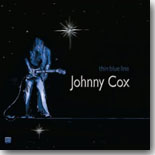 You might be surprised to find out that
Thin Blue
Line is Johnny Cox’s debut release. The Scottish
singer/songwriter/guitarist moved to Canada back in
the ’80s and was bitten by the Blues bug, embracing
the music of artists like Clapton, SRV, Albert King,
Buddy Guy, Robert Cray, and others. Starting out as
a guitarist, he started singing and writing his own
music. This first release shows his blues
influences, but also shows an original and unique
style as well.
You might be surprised to find out that
Thin Blue
Line is Johnny Cox’s debut release. The Scottish
singer/songwriter/guitarist moved to Canada back in
the ’80s and was bitten by the Blues bug, embracing
the music of artists like Clapton, SRV, Albert King,
Buddy Guy, Robert Cray, and others. Starting out as
a guitarist, he started singing and writing his own
music. This first release shows his blues
influences, but also shows an original and unique
style as well.
The opening track, “Your Love,” is a nice laidback
tune reminiscent of ’70s pop-rock, while “High Price
To Pay” is a lively blues-rocker. “Runaway Train” is
in the same vein, but at a slower pace and featuring
some sharp wah-wah guitar work from Cox. “New Way”
is an intense track with Latin rhythms, and
“Something For Me” is an inspirational tune that has
an Allman Brothers feel, with it’s jazzy backdrop
(courtesy of some nice keyboard work from Marty
Sammon) and a rhythm track similar to their “Trouble
No More.”
The title track is an easygoing number, encouraging
everyone to overcome their differences and get along
with each other, and “My Destination” is a funky
blues track with standout work from bass player
Kenny Neal, Jr. “I’m Fine” is a strong boogie rocker
and “All These Tears” moves toward reggae territory.
The ballad “Long Day” features a heartfelt, lonely
vocal from Cox, along with some expressive guitar,
and the amusing closer, “Didn’t Commit The Crime,”
offers up some of Cox’s best fret work of the disc.
In additon to Sammon (keyboards) and Neal (bass),
Cox is assisted by Richard Greenspoon (drums,
producer), Ian DeSouza, Malcolm McCuaig, and Jerome
Tucker (bass), Ansgar Schoer and Robbie Bellmore
(harmonica), and great backing vocals from Shelly
Zubot and Brad Roth. Thin Blue Line is an excellent
introduction to the music of Johnny Cox and sets the
bar pretty high for his next release.
---
Graham Clarke
 The Terry Hanck Band’s latest release on Delta
Groove Music, Gotta Bring It On Home To You, ain’t
nothin’ but a party. The former Elvin Bishop tenor
sax man has fronted his own band for over a quarter
of a century and has picked up several Blues Music
Awards and Living Blues Awards for Best Horn over
the past few years, and he’s got another
wall-to-wall winner with this release.
The Terry Hanck Band’s latest release on Delta
Groove Music, Gotta Bring It On Home To You, ain’t
nothin’ but a party. The former Elvin Bishop tenor
sax man has fronted his own band for over a quarter
of a century and has picked up several Blues Music
Awards and Living Blues Awards for Best Horn over
the past few years, and he’s got another
wall-to-wall winner with this release.
If you’ll notice, the album covers mentions “And
Friends,” and what a storied group of friends it is.
The list includes guitarist Debbie Davies,
keyboardists Jim Pugh and Lorenzo Farrell, baritone
sax monster Doug James, piano man Bob Welsh,
background vocalists Lisa Leu Andersen and Dennis
Dove, and guitarist/producer Chris “Kid” Andersen.
They perfectly complement Hanck and his band mates
(Johnny “Cat” Soubrand – guitar, Tim Wagar – bass,
Butch Cousins – drums).
Appropriately, Hanck opens with an Elvin Bishop
tune, “Right Now Is The Hour,” a soulful rocker with
lots of room for Hanck, Soubrand, and Welsh to
stretch out on their respective instruments. “Pins
and Needles” is a cool retro R&B tune, with some
nifty Farfisa organ from Pugh, and “My Last
Teardrop” sounds like an old lost Cookie and the
Cupcakes track with Hanck and James playing off each
other very nicely.
“No Gettin’ Over Me,” originally a hit by Ronnie
Milsap in the ’80s, gets a soul/blues reworking
here, with a nice vocal turn from Hanck, and Davies
and Hanck join forces vocally on the relaxed title
track. There are also two instrumentals --- ”T’s
Groove” is a jazzy number with some nice interplay
between Hanck, Pugh, Farrell, and Andersen, and the
rollicking “Jam Up,” showcases Hanck and James and
Welsh.
Though the focus of the disc is mostly on R&B, the
blues side is well represented with a solid cover of
B.B. King’s “Whole Lotta Lovin’,” Hanck’s own “Peace
of Mind,” which has a strong West Side bent, and the
closer, a tasty remake of the Bobby “Blue” Bland
vehicle, “One Horse Town.”
If you’re in the market for a new party record, you
can stop your search right now and pick up Gotta
Bring It Home To You. Terry Hanck and friends have
assembled the gold standard with this release. It’s
just a joy to hear from start to finish.
---
Graham Clarke
 This House (Eclecto Groove Records) finds
Nashville-based singer/songwriter/guitarist Shane
Dwight expanding on his previous release, 2011’s
excellent A Hundred White Lies. A lot of the
creative team from the previous release is present,
including producer Kevin McKendree, who also plays
all the keyboards, backup singer Bekka Bramlett, who
takes the lead on a couple of tracks on the new
disc, and rhythm section Steve Mackey (bass) and
Lynn Williams (drums). The key returnee is, of
course, Dwight, who brings another powerful,
personal set of tunes.
This House (Eclecto Groove Records) finds
Nashville-based singer/songwriter/guitarist Shane
Dwight expanding on his previous release, 2011’s
excellent A Hundred White Lies. A lot of the
creative team from the previous release is present,
including producer Kevin McKendree, who also plays
all the keyboards, backup singer Bekka Bramlett, who
takes the lead on a couple of tracks on the new
disc, and rhythm section Steve Mackey (bass) and
Lynn Williams (drums). The key returnee is, of
course, Dwight, who brings another powerful,
personal set of tunes.
Dwight’s music has always walked a thin line between
country and the blues, since he took inspiration
from both genres in his formative years. With This
House, he’s leaning more toward blues and R&B than
before, as can be heard on tracks like the title
track, which opens the disc and features a heartfelt
vocal from Dwight, supported by McKendree’s
keyboards, and Bramlett’s sweet backing vocals, and
“We Can Do This,” which has a springy, funky vibe
and a great guitar solo.
“Sing For Me (Search for Sierra)” is a blues ballad
with a droning, swampy atmosphere, and the swinging
shuffle “Devil’s Noose” is also a standout.
“Stepping Stone” and “Never Before are both raucous
blues rockers, and “I’m A Bad Man” gives Dwight
plenty of room to show his blues guitar chops. He
doesn’t forego his country background though, with
tracks like “Losing Ground,” and the gospel-flavored
closer, “Crazy Today.”
Dwight shares lead vocals with Bramlett on the
gritty rocker, “Bad For You,” and gives the lady the
spotlight completely on the lovely country-pop
confection, “It’s Gonna Be Beautiful.” Other
contributing musicians include Kenneth Blevens
(drums/percussion), Doug Lancio (rhythm guitar), and
Paul Ossola (upright bass).
With A Hundred White Lies, Shane Dwight set the bar
pretty high. On This House, it’s safe to say that
he’s set the bar even higher. This is must-listening
for not only blues fans, but also country and rock
fans as well.
---
Graham Clarke
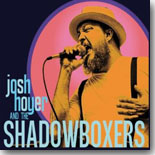 Josh Hoyer and The Shadowboxers was originally
conceived in 2012 in Lincoln, Nebraska. Hoyer, who’s
a solo artist and session musician, is already a
pretty big deal in the Lincoln area, in much demand
as a singer, musician, and arranger, and he and his
soulful nine-piece band are highly regarded in their
region. Their self-titled debut release should
expand their opportunities considerably.
Josh Hoyer and The Shadowboxers was originally
conceived in 2012 in Lincoln, Nebraska. Hoyer, who’s
a solo artist and session musician, is already a
pretty big deal in the Lincoln area, in much demand
as a singer, musician, and arranger, and he and his
soulful nine-piece band are highly regarded in their
region. Their self-titled debut release should
expand their opportunities considerably.
The band’s debut is a dynamite mix of soul and R&B,
with eight original compositions, including the
funky opener, “Shadowboxer,” which opens with a
lengthy vamp by the band before Hoyer dives in with
a strong vocal. “Close Your Eyes” is a smooth taste
of ’70s-era Memphis soul and “Illusion” is a catchy
southern funk rocker reminscent of Wet Willie. The
sparkling horn section kicks off “Everyday and
Everynight” with a vibe similar to James Brown, but
it settles back into a midtempo groove with some
smooth interplay between Hoyer and the backing
vocalists (Hanna Bendler, Kim Moser, and Megan
Spain).
“Just Call Me (I’ll Be Sure To Let You Down Again)”
is a slick soul ballad with more great work from the
horn section (Hoyer – baritone sax, Tommy Van Den
Berg – trombone, Michael Dee – tenor sax, flute, and
Russell Zimmer – trumpet), and “Til She’s Lovin’
Someone Else” has a rock feel with some tasty guitar
from Benny Kushner. “Make Time For Love” mixes
Memphis-styled horns, nicely percolating keyboards
froM Hoyer, and a greasy guitar riff from Kushner.
The closer, “Dirty World,” is a seven-minute-plus
funk workout that gives all the musicians ample
space to stretch.
Hoyer is the real deal on vocals, and the band
really rocks the house (thanks in no small part to
the tight rhythm section of Brian Morrow – bass, and
Justin G. Jones – drums, percussion). A good soul
record is hard to find these days, at least much
harder than it used to be when soul music was in its
heyday. This release will bring a smile to the faces
of those who recall those glorious days, and
hopefully it will help usher in a resurgence.
---
Graham Clarke
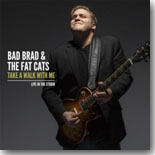 Brad Stivers learned to play guitar at the age of
10, learning to play the blues from listening to
B.B. King, Stevie Ray Vaughan, Robin Trower, Rory
Gallagher, and Jonny Lang. Now in his early
20s, he fronts the band Bad Brad & the Fat Cats
and they play many of Colorado’s blues festivals.
The band just released their second album, Take A
Walk With Me, which was recorded live in the studio
and is high-energy rocking blues at its finest.
Brad Stivers learned to play guitar at the age of
10, learning to play the blues from listening to
B.B. King, Stevie Ray Vaughan, Robin Trower, Rory
Gallagher, and Jonny Lang. Now in his early
20s, he fronts the band Bad Brad & the Fat Cats
and they play many of Colorado’s blues festivals.
The band just released their second album, Take A
Walk With Me, which was recorded live in the studio
and is high-energy rocking blues at its finest.
The title track opens the disc, and it’s a roaring
slidefest in the tradition of Elmore James. Hard to
imagine a disc getting off to a better start.
“Leghound” is a more sedate shuffle tune with some
nice accompaniment from Nic Clark on harmonica. “Ego
Trip” is an old fashioned John Lee Hooker-styled
boogie with guest Greg MacKenzie providing stellar
backing on harmonica. It’s so good that you hate for
it to end. The Texas shuffle “Take It Easy” is next,
followed by the breakneck blues-rocker “Going To The
Country,” and “Headin’ Out,” another blues-rocker
which has more of a hypnotic swampy feel.
“Lucky Man” is a nice change of pace, a slow blues
that features a strong vocal and some standout
guitar work from Stivers. “Other Side” has a funky
Crescent City rhythm and some slick slide guitar,
and “Runnin’ Me Down” moves back north to the Windy
City. “See My Way” features Dwight Carrier on
accordion, giving the track a touch of the Zydeco.
“Man On The Move” is a blues-rock shuffle with some
fiery lead work and a ragged but right vocal. If
you’re driving when the definitely uptempo “Train
Down South” playing, you might end up with a
speeding ticket. The closer, “UMA,” is a surf-rocker
that really shows Stivers’ versatility.
Vocally, Stivers reminds me of a cross between Omar
Dykes and John Fogerty, just the right amount of
grit and soul. He’s an amazingly diverse guitarist
who certainly learned a lot from those old records
he listened to as a kid, but he also throws a ton of
originality into the mix as well. The Fat Cats
(Clark – harmonica, Alec Stivers – drums) provide
some powerhouse backing on these 13 cuts. Fans of
modern blues with a rock edge really need to track
down Bad Brad & the Fat Cat’s Take A Walk With Me.
You can thank me later.
---
Graham Clarke
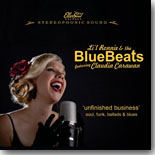 Here’s an interesting story. Back in 1991,
Li’l
Ronnie & the Blue Beats began recording their second
album, which featured the vocals of Claudia Carawan.
At the time, they had written all of the songs and
had even recorded eight of them, but for one reason
or another, the album was never completed and later
shelved as the band members went their separate
ways. 23 years later, they reconvened and decided to
finish what they had started years ago, and have
released the completed project on the EllerSoul
Records label as unfinished business.
Here’s an interesting story. Back in 1991,
Li’l
Ronnie & the Blue Beats began recording their second
album, which featured the vocals of Claudia Carawan.
At the time, they had written all of the songs and
had even recorded eight of them, but for one reason
or another, the album was never completed and later
shelved as the band members went their separate
ways. 23 years later, they reconvened and decided to
finish what they had started years ago, and have
released the completed project on the EllerSoul
Records label as unfinished business.
If you’re familiar with Li’l Ronnie Owens (of Li’l
Ronnie & the Grand Dukes) modus operandi, swinging
blues, jazz, and rock n’ roll, you will not be
disappointed with this release. The only difference
is with the soulful, gospel-influenced vocals of
Carawan, who ably handles everything pitched her
way, ranging from the gritty R&B of “Get Tough,”
“Thick and Thin,” and “Too Fast For Conditions,”
swing tracks like “Bring Your Fine Self Home,”
“Jump, Jimve, Then You Wail,” and “You Don’t Have To
Go Home,” and jazzy blues like “Hard Times,” “That’s
What A Girl Wants To Hear,” and “I Feel a Heartache
Coming On.”
However, the blues is front and center on tunes like
“Stop Cheatin’ Me Blind,” “Cold Hard Cash,” and the
Jimmy Reed-esque title track. Owens also sings lead
on a couple of the latter two tracks, sharing the
mic with Carawan on “Unfinished Business.” He also
tears into the raucous closing track, “I Had A
Warden for A Woman,” both vocally and on harmonica.
Joining Owens and Carawan are the rest of the
original Blue Beats (Jim Wark – guitar, Stu Grimes
– drums/percussion, Mike Moore – acoustic and
electric bass, and Ericson Holt – keyboards), and
they sound like they’ve never been apart.
So after
23 years, the question may be asked “was unfinished
business worth the wait?” From my viewpoint, I think
it was because it’s a strong, well-balanced set of
blues, swing, and R&B. Hopefully, they will reward
their listeners with even more good music in the
near future.
---
Graham Clarke
 Christy Rossiter & 112 North Duck’s latest release,
the band’s third, is called Stand Up & Raise Some
Hell (Applecopter), and if you liked their previous
effort, Gone Fishin’, you will find much to enjoy
with their latest. Singer Rossiter can bring it with
the best of them, with plenty of earthy sass and
brass, and guitarist Michael Beebe really raises
things up a notch with his fretwork. Of course, the
rock-solid backing of the rhythm section (Billy
Talacko – guitar, sax, David Beasley – bass, and J.
E. Van Horne) doesn’t hurt things one bit.
Christy Rossiter & 112 North Duck’s latest release,
the band’s third, is called Stand Up & Raise Some
Hell (Applecopter), and if you liked their previous
effort, Gone Fishin’, you will find much to enjoy
with their latest. Singer Rossiter can bring it with
the best of them, with plenty of earthy sass and
brass, and guitarist Michael Beebe really raises
things up a notch with his fretwork. Of course, the
rock-solid backing of the rhythm section (Billy
Talacko – guitar, sax, David Beasley – bass, and J.
E. Van Horne) doesn’t hurt things one bit.
This band can certainly play the blues, as heard on
tracks like “Shades of Gray,” “Take A Walk With Me,”
“Saddle Up And Ride,” the humorous “Smart Phone
Junkies,” and the sizzling album closer, “The
Westboro Blues.” However, they’re more than carry
their own on funky rockers like the title track and
“I’m Not Gonna Tell You,” or a tender ballad like
“Amy’s Song,” or the pop-flavored “The Way You Are”
and “Humuhumunukunukuapus’a.”
Stand Up And Raise Some Hell is a fun release that
showcases the considerable talents of Rossiter and
Beebe, both of whom will really impress listeners
once again. It will be interesting to see where the
band goes from here.
--- Graham Clarke
 Guitarist extraordinaire Kenny Parker is
joined on Yes Indeed! (Blue Angel Recordings)
by a front line of Detroit area bluesers (Garfield
Angove - vocals and harp, Tim Brockett or Chris Codish
-
keyboards, Bob Conner or Mike Marshall - standup and
electric basses, Renell Gonsalves at the drums,
Larry Lamb - saxes, and Andy Wickstrom - trumpet)
offering driving horns, vocals on one tune by The
Reverend Lowdown, and swinging backing vocals by
Fred “Slye” Foley, Harry Kuehler and Bob Payne on a
program of originals and well-chosen covers.
Guitarist extraordinaire Kenny Parker is
joined on Yes Indeed! (Blue Angel Recordings)
by a front line of Detroit area bluesers (Garfield
Angove - vocals and harp, Tim Brockett or Chris Codish
-
keyboards, Bob Conner or Mike Marshall - standup and
electric basses, Renell Gonsalves at the drums,
Larry Lamb - saxes, and Andy Wickstrom - trumpet)
offering driving horns, vocals on one tune by The
Reverend Lowdown, and swinging backing vocals by
Fred “Slye” Foley, Harry Kuehler and Bob Payne on a
program of originals and well-chosen covers.
The
result is one of the most enjoyable and finger
snapping blues albums to emerge in the past year.
Parker is dazzling. He swings, he cajoles, he
coaxes, he mesmerizes. From the opening title track
with it's 50s flare and gospellish backing vocals of
“Yes Indeed” to the original "Black Sweater" with that
hot harp and Stax backbeat (“man is she tall/and
those curves... I've got to have that girl in the
tight black sweater”) to his sizzling take on "Okie
Doke Stomp," this is evidence of a veteran guitarist
on top of his game.
That he brought along a killer
band is frosting. His version of Ike Turner's "Cuban
Getaway" is as good as you'll hear. His command of
the instrument is exceptional. Ditto the
instrumental "You'll Never Walk Alone."
In a five-star
world this is a five-star effort.
---
Mark E. Gallo
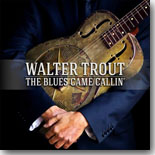 No offense to Joe
Bonamassa or Kenny Wayne Shepherd, but when I need a
good dose of blues/rock the man I turn to is Walter
Trout, hands down. 2014 was shaping up to be
Walter’s year, a year in which he celebrated an
amazing 25 year career as a solo artist. But fate
comes a calling and my friend is in Nebraska with
his lovely wife, Marie, first in line to receive a
new liver as soon as a match becomes available.
No offense to Joe
Bonamassa or Kenny Wayne Shepherd, but when I need a
good dose of blues/rock the man I turn to is Walter
Trout, hands down. 2014 was shaping up to be
Walter’s year, a year in which he celebrated an
amazing 25 year career as a solo artist. But fate
comes a calling and my friend is in Nebraska with
his lovely wife, Marie, first in line to receive a
new liver as soon as a match becomes available.
Over
the past year Walter has fought the odds, gaining
spiritual sustenance by being on the road, playing
for friends and family, recording his new record,
The Blues Came Callin’, and overseeing a litany of
projects with Provogue Records to mark this historic
milestone. At this point there isn’t much more to do
than hit play, so let’s hit it.
A heavy rhythm backbeat supports Walter as he opens
with “Wastin’ Away.” Faced with his own mortality,
Walter’s looking in the mirror and doesn’t recognize
the man he sees. “And that’s a price I’ve got to
pay…cause I feel like…I’m wastin’ away.” Walter’s
life is chronicled in a new book coming out, Rescued
from Reality, and while it’s apparent that Walter’s
past life is catching up with him he’s also not
letting a moment go by unappreciated.
We segue into
our next tune, with a heavy bass line and soaring
guitar intro from Walter, “The World is Goin’ Crazy
(And so am I).” Here we find Walter reflecting on
the current state of the world and he doesn’t like
what he sees. “Don’t believe our leaders…all they do
is lie…I feel the world is goin’ crazy…and baby, so
am.” I can’t argue Walter’s position at this
point. The world is indeed a crazy place and I’m
sure there are many of us joining Walter in his
feelings of goin’ crazy.
A more somber tone is
revealed on the next tune, a ballad called “The
Bottom of the River.” “I went out on the river…way
outside of town…I fell into the water….the current
pulled me down…it held me on the bottom…and I could
not hear a sound…I was lost in muddy water…and I
thought that I would drown.” His fall into the river
is a source of re-awakening for Walter and the voice
that called him into the light was right, “this ain’t your time to die.”
“Take a Little Time” finds Sasha Smith on the
keyboards front and center with Walter in a playful
mood. “You got to take a little time baby…take a
little time for love.” Walter is advising all of us
rushing through this very hectic world to take that
“little time for love.” We only get one life on this
earth so it’s very important to fill it with as much
love as we can. One of two covers on the disc, J.B.
Lenoir’s “The Whale,” is up next and Walter tackles
it with gusto. “They say the whale swallowed
Jonah…out on the deep, blue sea…Sometime, I get the
feeling…that same old whale…done swallowed me.”
Walter has the feeling that someday he will finally
cross over the hill to the other side, but not now
and definitely not soon.
Up next is “Willie” and
Walter himself is blowing some incredible harp on
this tune. Willie is a bandit, stealing when he can.
“Willie keeps on laughing…grabbing at that cash…he
got a bank account in Mexico…that’s where he hides
his stash.” Willie’s running a very tight game and
it’s only a matter of time before “his due is
called.”
John Mayall contributed a tune to Walter’s record,
the instrumental “Mayall’s Piano Boogie.” It’s a
nice, slow shuffle with his piano at the forefront
and Walter’s Strat providing the perfect foil to
John’s piano. I’m enjoying the interplay between
John and Walter, and appreciate John’s appearance on
Walter’s record. “Born in the City” finds Walter’s
guitar back at the forefront, where it should be, as
Walter tells us his tale. “I was born in the
city…lonely city is my home…but when I’m out
there…in the country….I feel so all alone.” Walter
appreciates the beauty and solitude of the country
but the city, with its hard edges, is the place that
Walter feels most at home.
Walter and the band move
onto another instrumental, “Tight Shoes,” and the
band’s at full force with Walter’s Strat doing the
talking and it reminds me why I’m drawn to his
guitar playing in the first place. A perfect example
of what happens when Walter and the band let their
hair down for us to enjoy.
The title cut, “The Blues Came Callin’,” is our next
cut and John Mayall again joins Walter and the band
for some intricate keyboard frenetics on the B3
while Walter does what he does best. “Last night,
the blues came calling…I heard it call me by my
name…He told me everything is different now…you
won’t ever be the same.” The blues has indeed come a
calling for Walter and there’s no doubt in my mind
that his current illness will change the man he is
into the man that he will become. Facing our own
mortality is never easy but Walter has looked it in
the eye and will be stronger for the journey.
The
band segues into “Hard Time,” Walter’s tale of been
done wrong. “You thought you found a true love….but
the love didn’t last too long…all alone…feel like
you’re locked up in a cage…and now you’re facing
solitary…your pain turns into rage.” Walter’s
blistering lead perfectly illustrates the pain of a
break up and that point in the relationship where
one has to deal with those “hard times.”
Walter and
the band close out the disc with another ballad,
“Nobody Moves Me Like You Do.” I would have to think
this is a song that Walter wrote for his lovely
wife, Marie, and his love for her is there for all
of us to see. “You showed me what love is…and woman,
don’t you know that is true…when I look in your
eyes, Baby…nobody moves me like you do.”
Walter’s life has definitely been a journey from the
hard living early days to these present moments he
shares with Marie and their children. The Blues
community has collectively gathered together to
support Walter’s quest for a new life, one I hope
he’s able to enjoy very soon. But he’s worked hard
to live in the here and, now and the proof is in The
Blues Came Callin’.
Other projects are in the works:
his book; a documentary and the re-release of the
majority of Walter’s recordings on vinyl for all to
enjoy. You can read more about Walter’s quest on his
website,
www.waltertrout.com, and appreciate
Walter’s 25 year career as a solo Blues artist. And
grab a copy of The Blues Came Callin’ while
you’re there, Walter wanted all of us to hear this
record and it’s easy for me to hear why. I hope it
is for you as well.
---
Kyle Deibler
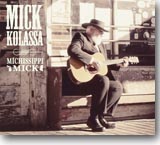 My enlightened buddy
Mick Kolassa is a man with a
big heart and a very generous nature. His
self-produced project, Michissippi Mick, was
conceived as a fundraiser to benefit two of his
favorite Blues Foundation programs: the Hart Fund
and Generation Blues. 100% of the proceeds from the
sale of the disc go to these programs. To accomplish
his goal, Mick assembled a team of some of Memphis’s
finest to aid in the effort. The resulting disc
shows that Mick is a Bluesman through and through,
and a pretty fair songwriter to boot. Let’s give it
a listen.
My enlightened buddy
Mick Kolassa is a man with a
big heart and a very generous nature. His
self-produced project, Michissippi Mick, was
conceived as a fundraiser to benefit two of his
favorite Blues Foundation programs: the Hart Fund
and Generation Blues. 100% of the proceeds from the
sale of the disc go to these programs. To accomplish
his goal, Mick assembled a team of some of Memphis’s
finest to aid in the effort. The resulting disc
shows that Mick is a Bluesman through and through,
and a pretty fair songwriter to boot. Let’s give it
a listen.
Up first is a re-worked version of W.C. Handy’s
“Beale Street Blues,” aptly entitled “New Beale
Street Blues.” The song is indeed new, with Eric
Hughes lending his expertise on the harmonica; Mick
enthralls us with Beale Street as it really is
today. “If Beale Street could talk…oh, if Beale
Street could talk…married men would have to pack up
their bags and walk…except one or two…who kinda like
booze…like me…Vince Johnson…and Eric Hughes.” I know
the principals involved too well to not attest to
the accuracy of this comment and we’ll leave it at
that.
Chris Stephenson’s organ work and Jeff
Jensen’s wicked guitar lead bring us to the next
tune, an original by Mick, “Blues Are All Around
You.” As Mick says, “The blues are all around
you…they’re everywhere you go…do what you can to try
and lose them…life is bound to give you more.."
That’s a Blues truism if there ever was one. The
rhythm section of Bill Ruffino on bass and Doug
McMinn on drums is present front and center as well
and the band really gives this tune a work-out.
Another well-chosen cover, “The Letter,” follows and
here we find Mick in an awful hurry to get back to
his woman. Reba Russell lends her voice to this tune
and it works well as a slow, burning, blues tune.
“Lonely days are gone…I’m going home…my baby wrote
me a letter.” Fortunately for Mick the letter
contained good news and he’s hot on the trail to
getting home as soon as possible for that woman’s
good loving. The organ is really sweet in the
background and I like Mick’s version a great deal.
Another old tune, “Reefer Man,” is next and Mick
proudly states he’s been singing the tune for over
40 years himself.. Victor Wainwright is on the piano
and the band knocks this one out of the park. “Have
you met this crazy reefer man?...Oh, baby,
baby…reefer man…trading dimes and nickels…called it
watermelon pickles….oh, that’s the reefer man.”
There’s not much more I can add to this tune, but the
band is definitely having a good time playing this
one.
Johnny Mercer’s “Blues in the Night” is up next
and this is another tune the band gives a nice twist
to. Brandon Santini brings his harp to this tune as
Mick tells us his tale of woe. “My mama done told
me…when I was in knee pants…my mama done told me,
son…a woman will sweet talk…she’ll give you the big
eye…oh but when that sweet talking’s done…a woman’s
two-faced…she’s a worrisome thing that will lead you
to sing the blues…in the night.” Oh yes, she will.
The tempo picks up on another tune by Mick, “Burned
that Bridge.” “I gave you all my money…and you only
asked for more…when I got home last night…you were
loving my best friend…I can’t take it no more,
woman…your time is at an end…you done burned that
bridge.” Victor’s twinkling the ivories again and
I’m enjoying the brief fills by Jeff, Bill and Doug
as well. Throw in Brandon’s harp and this is
probably my favorite tune on the disc.
Jeff’s guitar is back at the forefront with
Brandon’s harp as Mick conveys to us another of his
tunes, “Land of the Crossroads.” Mick’s lived in
Mississippi for over 20 years now so this is a
natural fit. “Standing in the land of the
crossroads…I can see both old and new…I see
history…history all around me…and I can see tomorrow
shining through.” The Delta is indeed a
juxtaposition of old and new, Mick’s tune captures
this feeling beautifully. Jeff’s amazing guitar tone
sets the stage for Mick’s next tune, “Baby’s Got
Another Lover.” Slow, mournful tunes emanate from
his guitar as Mick comes to the realization there’s
another man in his woman’s life. “Baby’s got another
lover…something, I don’t understand…you see, she
still loves me with all her heart…this other lover ain’t no natural man.” Mick’s definitely got a
problem on his hands and there really isn’t an easy
answer to it.
The band picks the tempo back up and Redd Velvet lends her vocal prowess to another one
of Mick’s tunes, “Blowtorch Love.” “Her love is like
a blowtorch…ain’t no little Bic lighter…ain’t no
roadside flare...step into the same room…you’ll feel
warmer…get too close, she’ll singe your hair.”
Brandon is blowing an amazing harp on this tune and
the intensity is definitely there. Redd’s position
is that “if you’ll bring the fuel, baby…I can
certainly start the fire.” I don’t doubt that for a
minute.
The tongue-in-cheek “W.P.D.” is next and Mick is
extolling his opinion on a particular human
condition. “It’s pretty hard to get through my
day…sometimes, things just don’t go my way…I try to
make it easy…every time I get the chance…but the
hardest thing for me to do…is watch white people
dance.” At least Mick is truthful enough to reveal he’s
not the best of dancers either. Brandon’s harp is
back to provide the lead for the last of Mick’s
tunes, “Time Ain’t on My Side”. Mick’s facing his
own mortality and the view through the looking glass
is sobering. “Worked all my life to get here…got
money to burn…ain’t got the energy to spend it…look
like I missed my turn…I get up in the morning…I
can’t bend down to tie my shoes….my mind says ‘let’s
boogie’…my body just flat out refused.” We’re all
growing older and, I for one appreciate Mick’s look
into the mirror.
The train whistle’s blowing and
Mick starts out yodeling on the final cut on the
record, Jimmie Rodgers’s “Mississippi River Blues.”
The Mississippi River calls all of us to the Delta
and if you’re not there, you definitely have the
Blues. The only cure is the muddy waters of the
Mississippi. I appreciate Mick’s homage to the river,
and this disc has been chockful of surprises and
amazing performances.
I’ve enjoyed the disc tremendously. Jeff Jensen did
an outstanding job of producing Michissippi Mick and
surrounding Mick Kolassa with some of Memphis’s
finest to aid in the cause. The fact that 100%
of the proceeds from the sale of this record go to
help generate revenue for the Hart Fund and
Generations Blues is just icing on the cake. Fortunately for us, finding this disc is relatively
easy, so grab a copy from iTunes, CDBaby or Amazon
as soon as possible. You’ll enjoy great tunes from
Mick Kolassa and contribute to a very worthwhile
cause.
---
Kyle Deibler